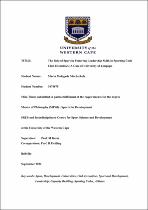The role of sport in fostering leadership skills in sporting code club executives: a case of University of Limpopo
Abstract
Leadership is a concept that cuts across a wide range of fields and domains and is a collective effort. “Leadership is identified as an important, but underdeveloped life skill among youth athletes”. The research problem addressed is that most universities’ attention is given to high-performance sport, whereas sport can also be used as a tool for development that is more inclusive, and not discriminating to everyone involved in it. The main research objective was to determine the role sport can play in fostering leadership skills in Sport Club Executives. The study used both qualitative and quantitative methods. Interviews and questionnaires were used to collect data. Interviews were conducted with the Head of Sport, and questionnaires were used to solicit information from twenty student athletes and ten staff athletes currently serving in the Executive of different Sporting Codes. Thematic Data Analysis was used to ensure confidentiality and anonymity, the respondents were given codes instead of using their real names. The interviews were later transcribed by the researcher while raw data was coded and clustered into categories and themes as they emerged from the data. SPSS was used to describe and analyse data and also assisted in distributing data into frequencies and percentages. The results of the study among others included athletes having acquired leadership skills, being able to lead, perform their duties as leaders and also mentor their successors. The study contributed to the awareness of institutions to put a programme and systems in place that would ensure that athletes are developed as leaders when their term of office ends. The research aims to empower the management of Club Executives to recognise the importance of leadership development to assist them in their strategic decisions and in their capacity building efforts.

